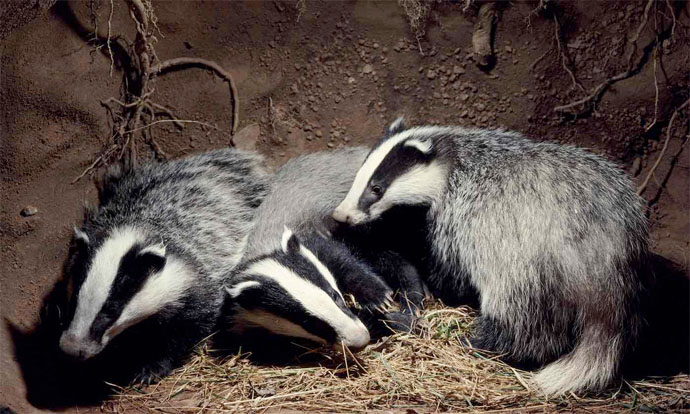GUARDIAN
Badgers Notebook
Badgers v farmers: finally we’re getting away from this polarised debate
3 April 2017 by Patrick Barkham
Bovine TB has been detected in everything from earthworms to cats. Rather than culling, we need a different way to compensate those who’ve lost cattle.

Monday 3 April 2017 17.53 BST Last modified on Monday 3 April 2017 17.54 BST T
he belief that badgers possess superpowers is supported by cameras in Utah’s Grassy Mountains, which have revealed a badger working for four days to bury a calf carcass much bigger than itself, before digging a new home next door.
The American badger, Taxidea taxus, is a different species to Britain’s native badger, but Meles meles is granted similar superpowers. It reshapes our landscape – their spectacular earthworks recently closed a Devon lane – and it destroys cattle. Badgers are widely believed to be the wildlife reservoir responsible for transmitting bovine TB to thousands of cattle, costing taxpayers £100m each year.
I attended a conference last week organised by Queen guitarist Brian May which gathered top scientists, vets, policymakers and some farmers to discuss bovine TB. This excellent symposium was a welcome antidote to the polarised debate between those for and against England’s badger cull, which killed 10,866 of the animals last autumn.
It was also an antidote to our badger-obsessed society’s cognitive bias. Because the badger is popularly considered to be spreading bovine TB, scientists are mostly funded to investigate its contribution to the disease. Seek, and ye shall find – a complicated picture in which cattle are the primary cause of infection and badgers avoid cows but may indirectly introduce the disease into some uninfected herds.
In fact, the conference revealed that bovine TB’s wildlife reservoir is actually our countryside. One study has found that bovine TB can survive outside an animal host – in the soil, say – for more than a year. And the disease has been detected in everything from earthworms to cats, sheep, pigs, alpacas and deer (I know one Exmoor farmer convinced that deer have transmitted it to her cattle).
Given that bovine TB is virtually endemic in certain regions, it is bizarre that a supposedly free-market government continues to pay compensation for cattle lost to this disease when a farm has endured it for a decade or more. Farmers have no incentive to diversify.
A quid pro quo closer to Tory principles would be to fund some badger culling but withdraw compensation for farmers if they have been “shut down” by bovine TB for, say, five years. This is not to criticise farmers. The disease is not their fault. In an ideal world, we’d accept that the badger is not a super-powered bovine TB spreader, consumers would pay twice as much for milk, and scientists would be funded to discover how better to combat this tricky disease’s spread through our soil and countryside.
A new endangered species
I came away from this conference newly optimistic because (anti-cull) Brian May is quietly working behind the scenes with some farmers to tackle bovine TB. Bravo. Hope is triggered by an awareness of human actions to repair our relationship with the planet. In that spirit is #EarthOptimism day in Britain on 22 April. Free talks in Cambridge will reveal Colombians’ coexistence with jaguars and Brazil’s reduction in deforestation, but also inspiring local examples – rewildling Wallasea Island, restoring the Fens. There’s also a “solutions fair” to marshal action. Optimism – an endangered species being brought back from the brink.
The beaver burger
There are now so many beavers in Germany that a politician called Klaus Burger (this reeks of April fool) has published recipes for cooking the protected mammal. Opponents say this is tasteless, but is it? I once ate roadkill badger. During my train ride home, it returned on me. So I know what I think. READ MORE